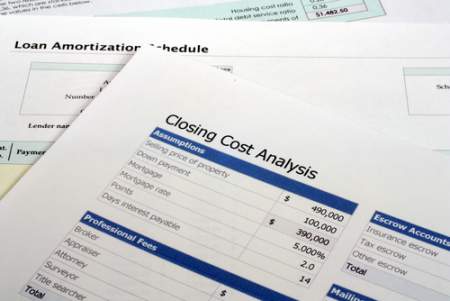If you’re planning to buy a new house, you’re most likely prepared for the money needed for the down payment and moving expenses. What you might not be ready for are the closing costs for home buyers. These are expected to be paid on closing day, and you don’t want to be caught off guard when you receive the list of estimates. Let’s take a closer look at what you can expect.
💰 What are closing costs?
 The term closing costs refers to the collection of fees that are associated with the home buying process when it comes to services and administrative tasks. Because the need for services and tasks varies from one transaction to the next, the costs for these can also vary. The closing costs can be the responsibility of the buyer, seller, or both.
The term closing costs refers to the collection of fees that are associated with the home buying process when it comes to services and administrative tasks. Because the need for services and tasks varies from one transaction to the next, the costs for these can also vary. The closing costs can be the responsibility of the buyer, seller, or both.
📝 What are closing costs based on?
There is no one company or person responsible for setting the price of the total amount needed for closing costs. The fees are based on the specific services and tasks needed for your home purchase. You can expect to pay between two and five percent of the total sale price of the home. The total is based on individual fees for things like inspections, appraisals, attorney services, and other real estate related transactions.
💵 What are typical closing costs for buyers?
While it’s common for sellers to assume responsibility for all or part of the closing costs, a buyer should be prepared to pay if the contract is negotiated to include them on the buyer’s end. As we noted previously, there’s no set list of fees, but you can get an idea of possible costs from the list below.

- Attorney Fees – You may need the services of an attorney to handle contracts required for the purchase of a home. In most cases, you’ll be required to pay for your own attorney.
- Application Fee – The mortgage lender may charge a fee to cover the cost of credit reports and underwriting.
- Courier Fees – There are times when documents need to be transported from one office to another.
- Inspection Fees – Before closing day, the property will go through one or more inspections. Pest inspections, systems inspections, and construction inspections are common.
- Escrow Deposit – You may be required to pay property tax and mortgage insurance ahead of time.
- Insurance Costs – You’ll need homeowners’ insurance on the new property. This is typically required before closing. You also may need mortgage insurance.
- Title Search – This fee covers the costs of searching the property’s title and ownership history.
- Title Transfer Fee – This fee will cover the administrative costs associated with transferring the property title from the seller to the buyer.
- Origination Fee – This is a fee that covers the administrative costs that are incurred by the lender. Some mortgages do not come with origination fees, but those that do are usually 1% of the total loan amount and are to be paid upon closing by the buyer.
- Survey Fee – This fee is paid to land surveyors who verify property lines and inspect things like fences and hedges that sit on the property borders. In some states, land surveying is not necessary, but in others, it is a requirement that may be at the expense of the buyer.
- VA Fee – If you’ve acquired a VA loan to pay for your home, you will be required to pay a VA loan fee. This fee is a percentage of your total loan that may vary based on the type of service you’ve selected as well as the amount of your down payment. Buyers are usually required to pay this cost at the time of closing, however, it may be possible to include this in the total loan costs.
💲 Which closing costs are tax deductible?
In the United States, some closing costs associated with purchasing a home may be tax deductible. Costs that are tax deductible include mortgage taxes and real estate tax. Services and fees for things such as couriers, home inspections and title searches are not usually tax deductible.
You’ll receive an estimate of closing costs well before closing day, but keep in mind that these may increase significantly before the process is complete. Before closing day, you will receive a copy of the complete costs that you’re expected to pay that is based on actual services received.
Your real estate agent can answer any questions you have about specific fees associated with the closing. They may also be able to negotiate the contract so that you’re paying less of the closing costs.